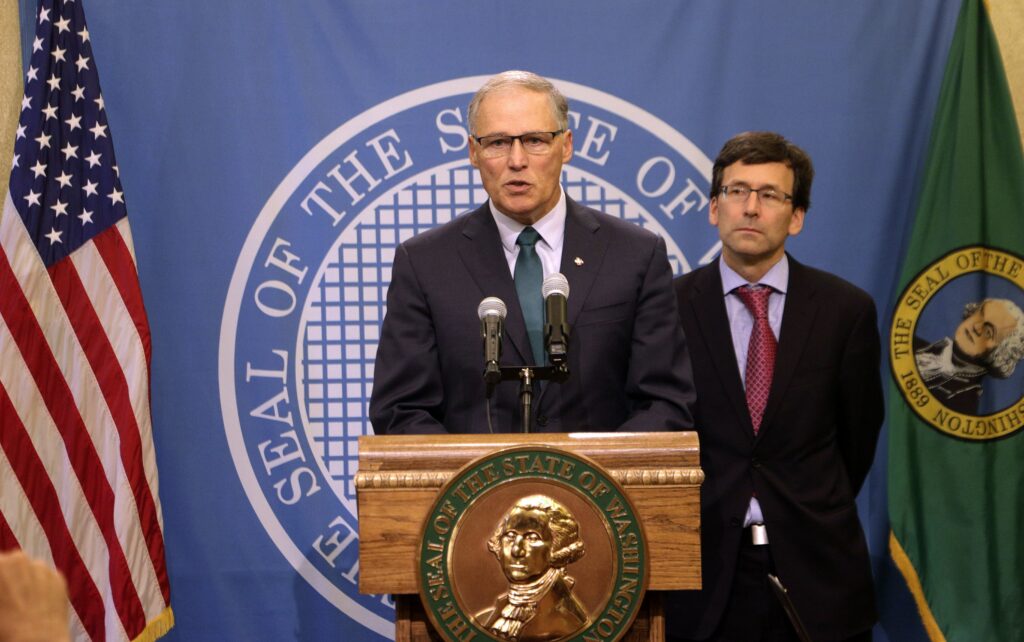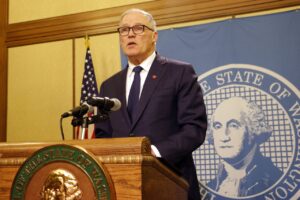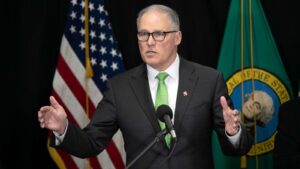Oregon’s COVID emergency declaration to end April 1 while Washington’s lingers
4 min read
Oregon Gov. Kate Brown will rescind her statewide COVID-19 emergency declaration on April 1. Washington state Gov. Jay Inslee, however, has given no indication he intends to end governing under an emergency proclamation he issued more than two years ago to combat the pandemic.
“But thanks to our collaboration with the Legislative Assembly and state agencies, the emergency declaration itself is no longer necessary to our ongoing COVID-19 response,” Brown explained in her March 17 executive order.
Oregon’s emergency declaration was first announced in March 2020. It has been the legal basis for executive orders issued by Brown throughout the pandemic, including orders regarding vaccine mandates, childcare, liability protections for schools, and college and university operations.
“I am confident that we can navigate those challenges, together, relying on the normal governmental process set forth in our laws,” she said.
Brown elaborated on that, saying, “As this pandemic and other disasters like catastrophic wildfires have taught us, a sudden crisis can require the Governor to invoke extraordinary emergency authorities, in order to respond immediately and to keep people safe. But those powers must be used carefully and sparingly, and only when absolutely necessary, as they temporarily alter the normal balance of power. Emergency powers cannot – and should not – go on forever. Instead, response efforts should be transitioned to normal government processes and authorities, as soon as possible, to ensure that essential checks and balances remain in place.”
She concluded, “Because of these efforts, Oregon now is in a position in which it can meet the challenges of COVID-19, using normal legislative and agency authorities and processes. For that reason, it is time to end the COVID-19 state of emergency.”
Charles Boyle, Brown’s deputy communications director, reiterated the governor’s reasoning for ending the emergency declaration.
“In Oregon, working with our Legislature, we have worked to transition pandemic-related functions to normal authorities,” he said in an email to The Center Square. “We plan to continue to work with our federal partners to draw down funds needed to address COVID-19, as other states that have ended their emergency declarations have.”
Federal funds play a role in Inslee’s insistence the emergency he declared in Washington state on Feb. 29, 2020 continue. Since then, Inslee has issued additional proclamations, including stay-at-home orders, school closures, an evictions moratorium, and mask and vaccine mandates.
The issue of federal money came up at a Jan. 28 virtual public hearing before the Senate State Government and Elections Committee on legislation to limit the governor’s emergency powers.
Legislation could be crafted to include an exception for an emergency order narrowly written solely to qualify for federal funds, testified Jason Mercier, director of the Center for Government Reform at the Washington Policy Center.
Maj. Gen. Bret Daugherty, who commands both the Washington Army National Guard and the Washington Air National Guard, indicated his opposition to that idea.
“Ending a proclamation early will put our federal money at risk,” the general said. “And recent disasters have shown that there’s a lot of money on the line.”
Daugherty said the exemption for federal funding Mercier proposed would not work as a practical matter.
“That’s really the hard wall that we’re up against here,” Daugherty said. “We can’t just shut off that proclamation because recovery goes on for years, and so that’s my concern here.”
During a Feb. 28 press conference, Inslee said he does not intend to end the state of emergency in the near future in part because of concerns about securing federal money.
“We need it to be able to keep federal funds, so we get federal assistance rather than state tax dollars,” the governor said.
Earlier this month, Inslee told KOMO News, “We’ve got to continue to have access to federal money. We need to continue to help people get testing when they want it. We need to continue to help people getting access to vaccines, including this booster which is very important. All of that can be assisted by having this emergency order.”
Mike Faulk, Inslee’s press secretary, defended the ongoing state of emergency as a means of ensuring federal dollars for Washington state.
“The governor’s policy advisers, his general counsel, and the state Emergency Management Department have all looked at the tools available to us and concluded our state risks federal funding by lifting the order,” he said via email. “There are 20 states with COVID emergency orders still in effect, with Democrat and Republican governors, and it will be 19 when Oregon transitions.”
Faulk included a link to the National Academy for State Health Policy website detailing emergency health declarations by state.
This article was originally posted on Oregon’s COVID emergency declaration to end April 1 while Washington’s lingers






